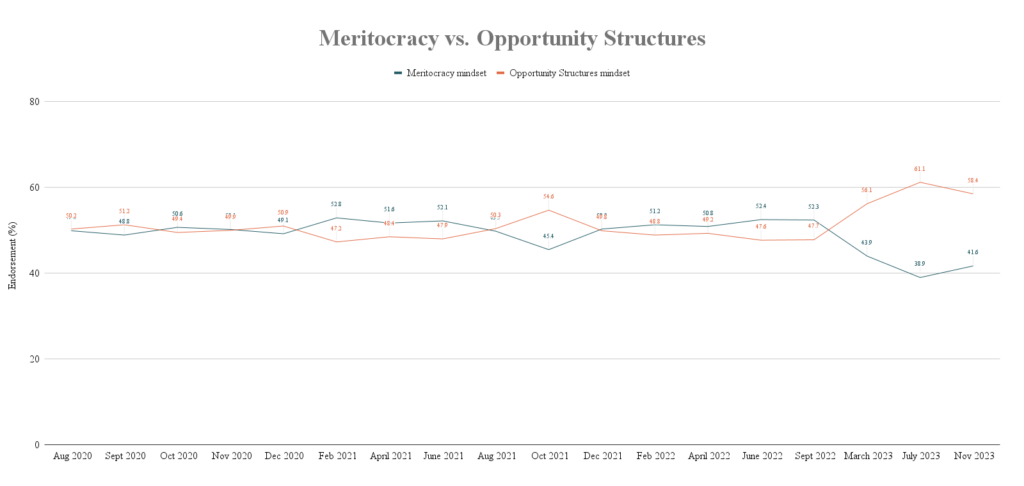
On Culture / Jan 19, 2024
Is Election Discourse Influencing How Americans Think about Financial Success?

Welcome to On Culture, a new monthly blog from the FrameWorks Institute’s Culture Change Project. Here, we’ll provide regular updates from our ongoing qualitative and quantitative research, share emerging findings and recommendations, and respond to current events and questions you might have for us. We are so glad you’re here!
We’re at the start of a presidential election year and, as is typical in the runup to big elections, public discourse about the economy is ramping up significantly. Even (and maybe especially?) on TikTok, the general sentiment of economic despair is palpable. Within and outside of social media, talk of housing affordability, the wealth gap, and “Bidenomics” are widespread.
This month, as we look over trends in American mindsets about the economy, we’re examining the deep-seated patterns in thinking that shape how people make sense of, or contribute to, this discourse. In particular, we’re interested in what people think about when they think about financial success—and where it comes from. Let’s take a look at two mindsets that had, until recently, been relatively balanced and stable over the course of the Culture Change Project: a meritocratic mindset (the idea that financial success is due to talent and hard work) and an opportunity structures mindset (the idea that the opportunities we have access to shape our economic outcomes).
As I mentioned, that balance had been stable. But with all the heightened discourse about the economy of late—from inflation to interest rates to housing prices—it looks like the relative power of these mindsets to shape our thinking might be shifting.
In our culture tracking survey, we regularly ask respondents whether they believe financial success is due to talent and hard work or differences in opportunities. These questions are designed to measure the relative strength of the meritocracy and opportunity structures mindsets, respectively. As you can see in the graph below, the mindsets have been roughly equally endorsed for years—but in 2023, that started to change.

Meritocracy vs. Opportunity Structures Graph [Download]
In March of last year, respondents began endorsing the opportunity structures mindset at higher levels than we’d seen since the start of the project (2020). By July 2023, 61 percent of research participants were endorsing the opportunity structures mindset over meritocracy. This trend held throughout the year, with 58 percent of participants endorsing the opportunity structures mindset in November of 2023.
This suggests that something is changing in how people are thinking about economic success—and that this change in thinking isn’t just a temporary “blip,” but has been sustained for almost a year now.
We suspect that the weakening of the meritocracy mindset has something to do with the upcoming presidential election. Whether messaging is about the failure or success of the current administration’s economic policies, much of the election discourse has revolved around how the economy—through the actions of the administration (and Congress)—affects people’s daily lives. That is likely reinforcing the idea that collective decisions, not just personal effort, affect people’s outcomes.
Populist messaging from the right is also likely undercutting meritocratic thinking. Compared to neoliberal conservatives who take a “free market” approach and suggest that government should stop interfering and let the market and individuals “work,” populist conservatives are more likely to suggest that the government should intervene—they just disagree with who government should be intervening on behalf of.
Our data suggests that this could be an important moment of opportunity for progressive communicators. But importantly, it isn’t enough for communicators to make clear that government matters. We need to explain how government decisions affect people’s lives and pocketbooks, connecting the dots so that people understand how progressive policies can benefit people. (For example, the child tax credit.) And we need to make a proactive case about who government should benefit, actively countering the racist and xenophobic narratives that are already running rampant and are sure to increase in circulation and power during this year’s election.
We will continue to follow the meritocracy and opportunity structures mindsets in the coming months, and will keep you posted as we learn more. Stay tuned by making sure you are subscribed to the On Culture newsletter!
RELATED RESOURCES:
- For more on economic mindsets and how we’ve seen them fluctuate, check out our 2023 Research Update.
- For guidance on how to frame major economic issues like housing, neighborhoods, and food infrastructure, check out our economic justice research and resources.
- For how to make the active case for policies that benefit all of us, not just corporations and the wealthy, make sure you are subscribed to the On Culture newsletter! This spring, we’ll be releasing new research on how progressive communicators can effectively claim the already-popular “system is rigged” frame to talk about our political and economic systems in ways that fuel systemic action.